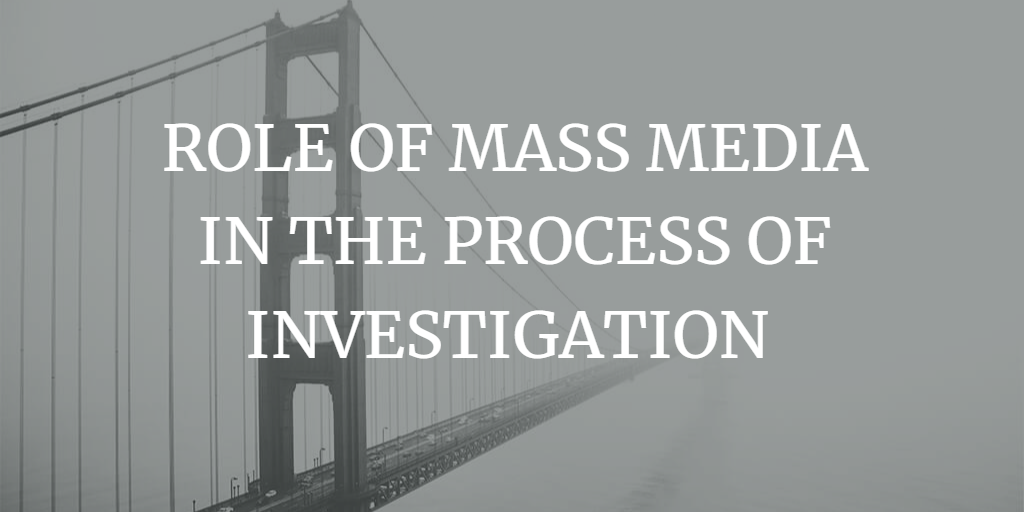ROLE OF MASS MEDIA IN THE PROCESS OF INVESTIGATION

Table of Contents
Introduction
Positive Role of Mass Media in Investigations
Negative Impacts of Mass Media on Investigations
Legal Framework Governing Mass Media and Investigations
Striking a Balance: Responsible Reporting
Recommendations
Conclusion
Introduction
Mass media plays a significant role in shaping public opinion and disseminating information in India. As a watchdog of society, the media also plays a crucial role in the process of investigation, highlighting issues and raising awareness. This article discusses the positive and negative aspects of mass media's involvement in investigations, the legal framework, and the potential solutions to ensure responsible reporting.
Positive Role of Mass Media in Investigations
Mass media can contribute positively to the investigation process in several ways:
Exposing corruption and wrongdoing: The media can bring attention to cases of corruption, malpractice, or criminal activity, helping to initiate investigations and hold the perpetrators accountable.
Informing the public: By reporting on ongoing investigations, the media keeps the public informed about significant cases, fostering transparency and public trust in the justice system.
Mobilizing public support: Media coverage can generate public support for investigations, encouraging witnesses and informants to come forward and contribute to the investigative process.
Negative Impacts of Mass Media on Investigations
While mass media can play a constructive role, it can also exert a negative influence on the investigation process:
Media trials: Excessive media coverage can lead to "media trials," where public opinion is swayed before a fair trial can take place, potentially undermining the judicial process.
Invasion of privacy: Sensationalist and intrusive reporting can violate the privacy of the individuals involved in an investigation, causing emotional distress and reputational damage.
Compromising investigations: Leaking sensitive information or publishing speculative stories can compromise ongoing investigations, hinder the collection of evidence, and jeopardize the outcome.
Legal Framework Governing Mass Media and Investigations
In India, the legal framework governing mass media and investigations includes:
Indian Penal Code (IPC): Sections related to defamation, public mischief, and contempt of court can be applied to irresponsible reporting in the context of investigations.
Contempt of Courts Act, 1971: This Act addresses the issue of contempt of court, which can arise from prejudicial reporting during an ongoing investigation or trial.
Press Council of India: The Press Council, a statutory body, is responsible for maintaining the ethical standards of the press and ensuring responsible reporting.
Striking a Balance: Responsible Reporting
Striking a balance between the media's role in investigations and the need for responsible reporting is vital to uphold the principles of justice, fairness, and privacy.
Recommendations
To ensure responsible reporting in the context of investigations, the following steps can be taken:
Media self-regulation: Encourage media organizations to adopt self-regulatory mechanisms, such as codes of ethics and editorial guidelines, to ensure responsible reporting.
Training and workshops: Conduct training and workshops for journalists and media professionals to educate them about the legal and ethical implications of reporting on investigations.
Transparency: Ensure that media organizations are transparent about their sources, methods, and editorial decisions to foster public trust and accountability.
Collaboration: Encourage collaboration between law enforcement agencies and media outlets to facilitate accurate and responsible reporting while protecting the integrity of investigations.
Legal awareness: Increase awareness among media professionals about the legal framework governing reporting on investigations, to prevent violations of privacy and contempt of court.
Conclusion
The role of mass media in the process of investigation in India is undeniably significant. When balanced with responsible reporting, the media can contribute positively to the pursuit of justice and transparency. By adopting self-regulatory mechanisms, increasing legal awareness, and fostering collaboration between media and law enforcement, the media can continue to serve as a vital watchdog while respecting the rights of individuals and the integrity of the investigative process.


